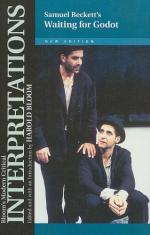|
This section contains 4,893 words (approx. 17 pages at 300 words per page) |

|
SOURCE: Johansson, Birgitta. “Beckett and the Apophatic in Selected Shorter Texts.” Samuel Beckett Today 9 (2000): 55-66.
In the following essay, Johansson explores Beckett's utilization of the apophatic approach, which is the theory that God is unknowable, in his short texts.
Samuel Beckett's rambling discourses play with boundaries between the sacred and the secular. His protagonists can represent voices that pray, although they may not always be conscious of this. At least, praying does not appear to be their main objective in life, if one can speak of objectives or volition in their case. As Lawrence E. Harvey puts it, “renunciation of personal will” in Watt, for example, “is couched in religious language that suggests the ascetic preliminaries to mystic experience” (Harvey 1970, 364). This is an initial implication of a bond between Beckett and theology.
Scholarly studies such as Laura Barge's, God, the Quest, the Hero: Thematic Structures in Beckett's Fiction...
|
This section contains 4,893 words (approx. 17 pages at 300 words per page) |

|


